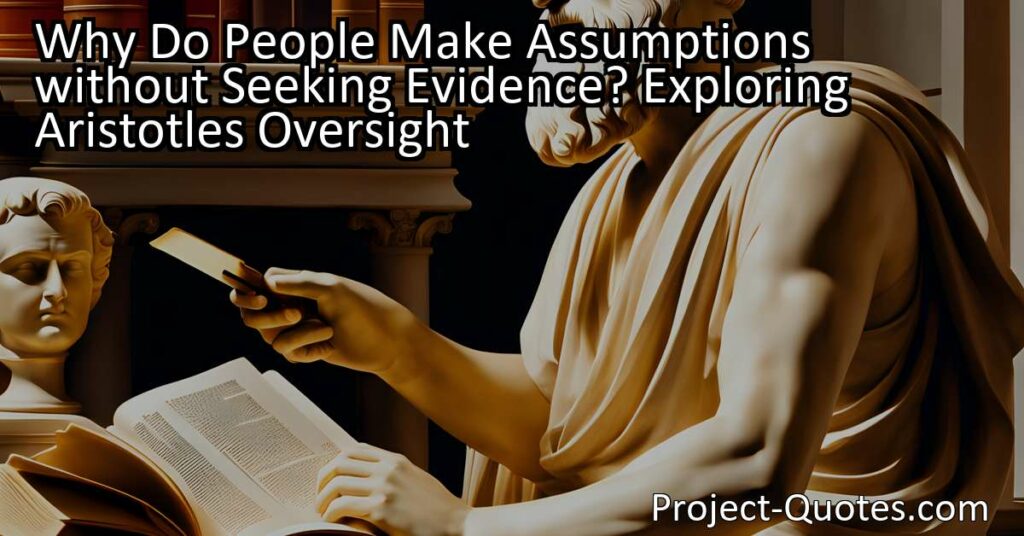Aristotle maintained that women have fewer teeth than men although he was twice married, it never occurred to him to verify this statement by examining his wives’ mouths.
Bertrand Russell
Why Do People Make Assumptions without Seeking Evidence? Even brilliant minds like Aristotle can fall victim to making assumptions without seeking evidence, as seen in his claim that women have fewer teeth than men. This incident highlights the human tendency to believe without questioning and emphasizes the importance of seeking evidence and challenging assumptions, as pointed out by philosopher Bertrand Russell. By questioning our own assumptions and seeking evidence, we contribute to a society that values critical thinking and the pursuit of truth.
Table of Contents
- 1 Aristotle maintained that women have fewer teeth than men although he was twice married, it never occurred to him to verify this statement by examining his wives’ mouths.
- 2 Bertrand Russell
- 3 Meaning of Quote – Aristotle maintained that women have fewer teeth than men although he was twice married, it never occurred to him to verify this statement by examining his wives’ mouths.
- 4 Freely Shareable Quote Image
- 5 Related
Meaning of Quote – Aristotle maintained that women have fewer teeth than men although he was twice married, it never occurred to him to verify this statement by examining his wives’ mouths.
Have you ever wondered why people make assumptions without seeking evidence? It seems that even brilliant minds can succumb to this tendency. One such example is the famous philosopher Aristotle, who maintained that women have fewer teeth than men. Surprisingly, he never bothered to verify this statement by simply looking into his wives’ mouths, despite being married twice. This observation, made by the British philosopher Bertrand Russell, raises some interesting questions about the human tendency to believe without questioning and the importance of seeking evidence.
Now, it’s important to note that Aristotle was an immensely influential figure in ancient Greece. He laid the foundation for numerous fields of study, from philosophy to biology. His influential works on ethics, politics, and metaphysics shaped Western thought for centuries to come. However, even great minds like Aristotle’s can sometimes be blinded by their own assumptions.
In this case, Aristotle’s statement about women having fewer teeth than men is a clear example of such an assumption. While it is true that men and women may have minor biological differences, such as hormonal variations or reproductive systems, the number of teeth is not one of them. Human beings, regardless of their gender, typically have 32 teeth 8 incisors, 4 canines, 8 premolars, and 12 molars.
What is fascinating, though, is that Aristotle never bothered to verify this claim for himself, despite being married twice. One might wonder why a great philosopher like him did not simply open his wives’ mouths and count their teeth. Perhaps he took this assumption for granted, believing it to be an inherent truth due to societal conventions or preconceived notions. After all, in Aristotle’s time, cultural norms and beliefs about the role of men and women were vastly different from those of today.
It is worth mentioning that Aristotle’s oversight does not make him any less of a brilliant thinker. Rather, it highlights the fact that even the most intelligent individuals can fall victim to assumptions or biases. This isn’t exclusive to men or women; it’s a part of human nature.
Bertrand Russell, a philosopher and mathematician renowned for his logical and analytic thinking, pointed out Aristotle’s oversight to highlight the importance of questioning assumptions and seeking evidence. In his observation, Russell suggests that it is essential to subject our beliefs to scrutiny and verify them through observation and research.
Moreover, Russell’s observation serves as a reminder that assumptions, even when made by brilliant minds, should not be taken as absolute truths. Rather, they should be challenged and examined critically. In the case of Aristotle’s statement, his overlooking a simple remedy to verify his assumption calls into question the credibility of his claim.
However, it is important to approach this topic with nuance. Aristotle lived in ancient times, long before the scientific method and empirical research became the norm. The standards of scientific inquiry we uphold today were not prevalent in his era. Therefore, it is crucial to consider the context in which he made this assumption.
Nevertheless, this episode emphasizes the significance of questioning assumptions and seeking evidence even in the absence of modern scientific methods. The ability to critically evaluate information and beliefs ensures that our knowledge continues to evolve and improve progressively.
In conclusion, the quote by Bertrand Russell about Aristotle’s oversight serves as a valuable reminder to question assumptions and seek evidence. Aristotle, despite his remarkable contributions to various fields, overlooked the simple task of verifying his assumption about women having fewer teeth than men. This incident highlights the fallibility of even great minds and the importance of humility and curiosity in the pursuit of knowledge. In our own lives, we should strive to question our assumptions, subject them to scrutiny, and seek evidence to avoid perpetuating false beliefs or ideas. By doing so, we can contribute to a society that values critical thinking and the pursuit of truth.
I hope this quote inspired image brings you hope and peace. Share it with someone who needs it today!


